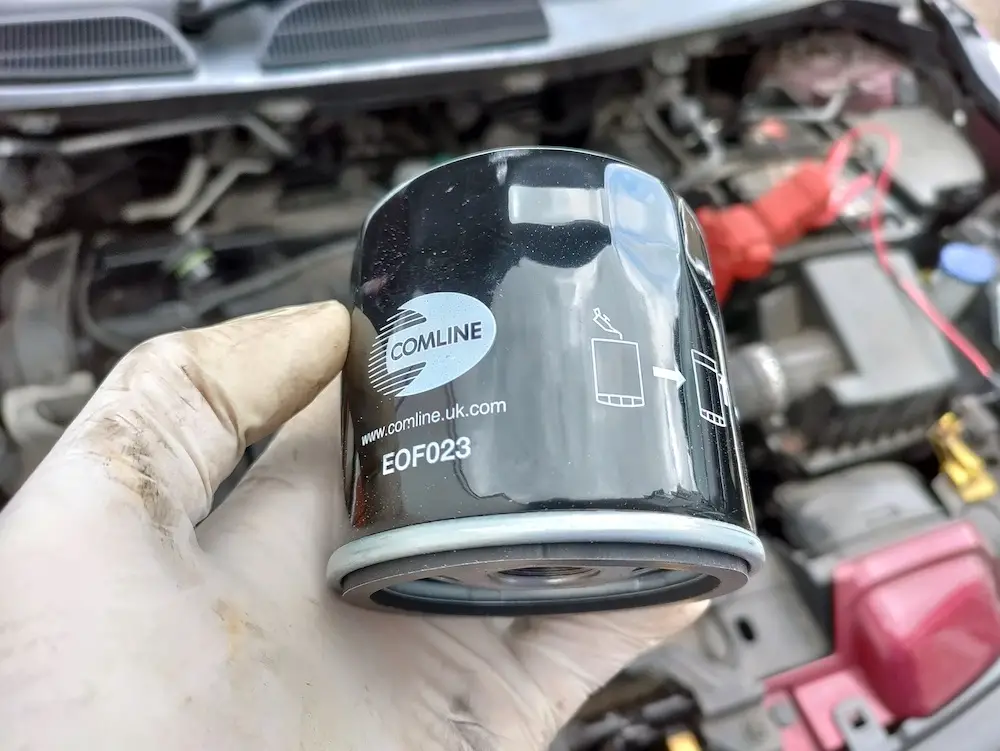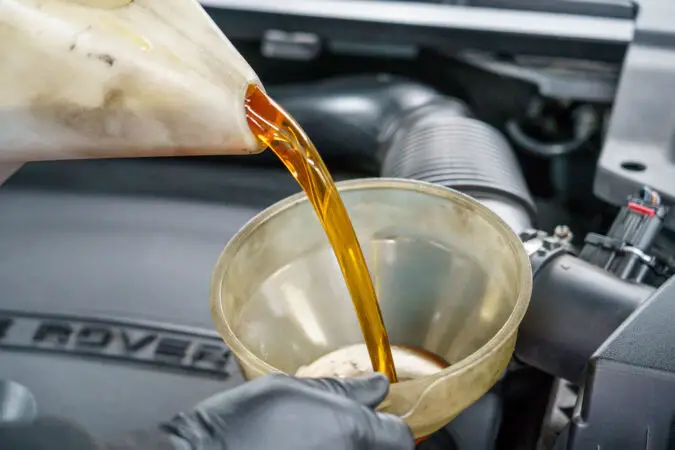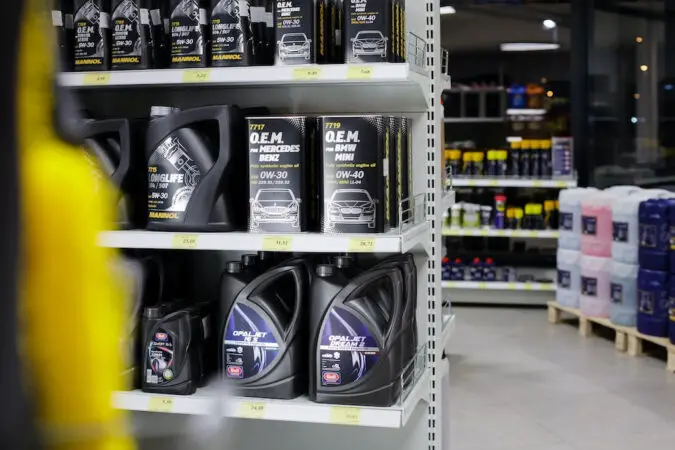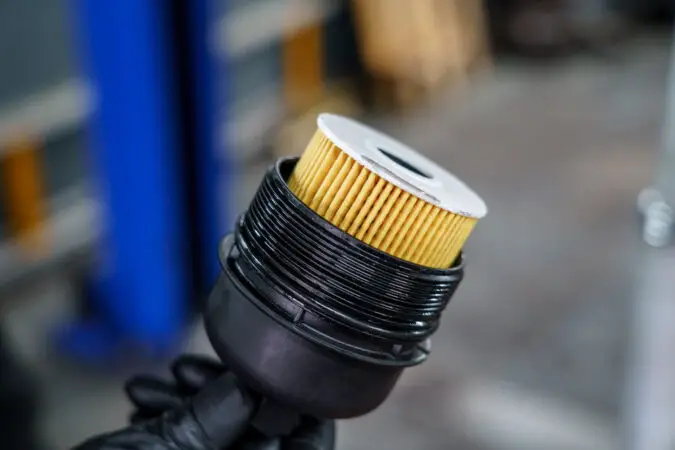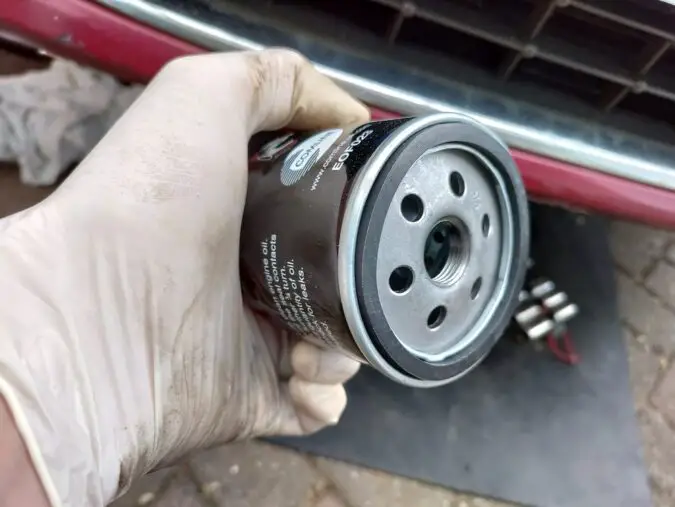In this article, we will be discussing everything about synthetic oil, oil filters, and the best oil filter for synthetic oil. Synthetic oil replacement should be really easy to sell these days.
The use of synthetic lubricants is becoming more common. This is not just because customers understand the benefits of using high-quality lubricants and premium filters. But also because all automakers are now pushing the limits of recommended discharge intervals required by synthetic lubricants.
This has resulted in synthetic filters offering immense value for money and efficiency. Now let’s learn all about the differences between conventional and synthetic oil and see which is the best oil filter for synthetic oil.
- Engine Oil Types
- Synthetic Engine Oil
- Oil Filter
- Components and Working
- Types Of Oil Filters
- Synthetic Oil Filter
- Best Oil Filters
- Best Oil Filter Brand
- Conclusion
- F.A.Q
Regular Vs Synthetic Oil
Most vehicles can use synthetic or conventional mineral oil. But they are all required to meet the specifications put forward by both American Petroleum Institute (API) and the International Lubricant Standardization and Advisory Committee (ILSAC).
However, synthetic oils are often sold as having better performance than traditional oils. This good performance is only relevant for certain properties and may not be related to other properties. Some formulations of traditional mineral oils can perform well with certain properties.
Advantages And Disadvantages Of Synthetic Oil
1. Anti-Oxidation Properties
Traditional mineral oils are usually more susceptible to chemical decomposition (oxidation) than synthetic oils under certain conditions.
These harmful conditions include combustion by-products, fuel pollution, water pollution, metal particles, acids, oxidants, and extreme heat (such as due to combustion).
Exposure to these conditions typically occurs in the engine. Deterioration of oil can cause sludge, varnish or deposits, corrosion, changes in viscosity, and poor engine performance.
2. Higher Viscosity Index
Naturally, plastic has a high viscosity index. This means that the change in viscosity will be less (more stable) as the temperature changes during normal engine startup and under normal operating conditions.
Viscosity is an important property of lubricants. It helps create a film thickness or distance between metal surfaces that slide or rotate with each other. Without this film thickness, excessive friction and wear will occur.
3. Ability To Perform Better In Extreme Climatic Conditions
Mineral oil (compared to synthetic oil) become very thick (highly viscous) at very low temperatures. This means that it cannot be effectively pumped or circulated in the engine while the temperature is extremely low.
Insufficient oil circulation can lead to a lack of lubricating oil and engine failure. Synthetic motor oils are generally less volatile than mineral oils.
This results in less oil being lost in the exhaust stream thus minimizing air pollution. This can also mean that less amount of make-up oil is required during the oil change.
4. Longer Lifespan
Perhaps the biggest advantage, and why synthetic oils are so popular is that they have a longer service life than traditional petroleum. The recommended replacement interval for synthetic oils is approximately every 5,000 to 7,000 miles.
However, some brands advertise much longer intervals (15,000 to 25,000). The first point above explains the main reason for the longer oil change intervals. Regardless of the type of oil used, it is recommended to change the oil at regular intervals recommended by the manufacturer.
Oil Filter
An oil filter is a mechanical device that removes dirt, dirt, and unburned fuel from circulation. This component circulates only fresh oil to the engine and keeps it dirty. Due to this reason, the oil filter must be treated or replaced within a certain period of time.
Other vehicle hydraulic systems, such as automatic transmissions and power steering, are equipped with oil filters. Gas turbine engines such as jets also use oil filters. In all categories of vehicles, oil filters are used as a component for purifying oil and removing dirt from the oil before circulating it.
Functions Of An Oil Filter
Engines, as previously said, emit dirt particles and combustion residues such as dust, metal debris, oil carbons, and so on. Before entering the engine, oil filters catch this particle from the oil. The oil filter cleans the motor oil because clean oil ensures the consistent performance of the engine.
Soot contaminates the oil and dirt, thickening it. Oil filters have many thinning holes. These prevent heavy oil from entering the engine from the pump. All moving parts such as connecting rods, camshafts, and valvetrains are protected from wear and damage if the filter works properly.
Components Of An Oil Filter
1. Tapping Plate
The tapping plate is the inlet and outlet of the oil filter. There is a small hole in the rim that allows the free flow of oil to the filter canister. The screw hole in the center is where the oil drains and faces the engine.
2. Anti-Drain-Back Valve
The anti-drain-back valve is a rubber valve with a flap. Its function is to prevent oil from flowing back into the filter when the engine is stopped. This was necessary because the filter is between the center and the bottom of the engine.
3. Filter Medium
Porous filter media contains fine cellulose fibers and synthetic fibers such as polyester and glass. Helps increase the durability and efficiency of filtration.
To provide rigidity and strength, it is also saturated with resin. High-performance filters are equipped with more synthetic fibers.
4. Pleats
Folded filter media creates a larger total surface. Now, the thickness of the medium determines the number of pleats.
5. Center Steel Tube
This oil filter part gives the filter a structure and allows the filtered oil to be returned to the engine. The number, size, and location of the holes ensure that the oil flow is effective and unrestricted.
6. Relief Valve
The oil can be too thick to filter with a cold start. So you need to make sure the engine doesn’t starve. When enough pressure is applied to push down the calibrated spring, the relief valve equipped in the oil filter opens. This allows unfiltered oil to enter the center tube from above.
7. End Disc
Fiber or metal end discs prevent unfiltered oil from leaking into the center tube. Both ends of the filter media are connected to this end disk.
8. Retainer
A retainer is a piece of metal that acts as a leaf spring. Adhere the filter media and endplate to the tapping plate.
How Does An Oil Filter Work
There is a metal can with a gasket on the outside of the filter. This can be snugly fixed to the mating surface of the engine. The bottom plate of the can holds the gasket and is perforated around the area just inside the gasket.
The central hole is tapped to engage the oil filter assembly of the engine block. The can contains a filter material, mostly made of synthetic fibers.
The engine’s oil pump feeds the oil directly to the filter through the holes around the base plate. Dirty oil is sent through a filter medium (extruded under pressure). Then it returns through a central hole where it reenters the engine.
Are All Oil Filters The Same
No, not all oil filters are the same. There are different types of oil filters and we will now discuss each one of them.
Full-Flow Oil Filter
Known as primary oil filters, full-flow oil filters are the most common type used in automobiles. It is designed to remove contaminants from all the oils used by the engine. Full flow filters are designed to operate especially at low temperatures.
These types of filters allow oil to move more freely in the engine than other types. If the filters are too tight, the engine will run out of oil and can damage parts. This is why full-flow filters are so good that they provide enough oil for the engine to run efficiently.
Cartridge Oil Filter
Cartridges are a type of full-flow oil filter that is less complex and easier to use. This type of oil filter can be easily inspected without removing the oil as it is installed upright. These types of filters are available in both metal and fiber. But most are made up of fiber and therefore easy to recycle.
Spin-On Oil Filter
Spin-on filters are another type of full-flow oil filter. It consists of a steel canister with paper elements. It’s easy to install and requires minimal tools. Hence car owners can easily repair it themselves.
Secondary Or By-pass Oil Filter
Some vehicles use secondary oil filters to support vehicles with full-flow filters. They are designed to clean less than 10% of engine oil. The contaminants that aren’t removed by the full-flow filter are removed by the secondary oil filter. These types of filters extend the life of the engine oil and further protect the engine.
Spinner Oil Filter
A spinner oil filter is a type of secondary oil filter. It uses centrifugal force to remove contaminants from engine oil. Some filters can generate over 2,000 forces, which is greater than gravity. These types of filters have the ability to remove minimal impurities from engine oil.
Magnetic Oil Filter
Like the spinner oil filter, the magnetic oil filter is a kind of secondary filter that supports the full flow version. It is designed to effectively remove metal contaminants from engine oil.
However, it does not remove dust and dirt. Like other types, a magnetic oil filter does not need to be replaced. All you need is regular cleaning to maintain functionality.
Synthetic Oil Filter
Synthetic media and petroleum technology were first invented in 1929. As mentioned above, synthetic oil filters are better than regular oil filters. Other simple advantages of synthetic oil filters include:
- It provides particles of uniform molecular size and reduces engine friction.
- It features additional boost technology that provides protection and a clean engine.
- Designed to hold more pressure, synthetic oil filters work better in extreme weather.
- Decontaminating all contaminants from the oil ensures a cleaner oil.
State-of-the-art technology is used to manufacture synthetic oils. Most car manufacturers recommend them. However, it is not necessary to specifically use a synthetic oil filter, for synthetic oils.
All types of oil filters can be used with synthetic oils. However, to get all the benefits of synthetic oils, we recommend using an oil filter that is compatible with synthetic oils.
Best Oil Filters For Synthetic Oil
Purolator Boss
Purolator oil filters are one of the best-selling oil filters in recent years and for good reason. Specially made for synthetic oils their top filter is the BOSS line.
The Purolator BOSS has a decontamination capacity of 27 grams. They can hold nearly twice the amount of contaminants (for 15g) of the already excellent Purolator ONE filter.
This means you can drive up to 15,000 miles (under optimal conditions) before replacing the filter. Ideal for long-life synthetic motor oils.
Efficiency
The Purolator Boss oil filter contains high-quality components and materials. These include a metal bypass valve, metal center tube, end cap, and silicon check valve.
It is designed to withstand extensive driving and engine demands. This filter is called “high density synthetic mixed media” and achieves 99% efficiency.
The value that the Purolator oil filter provides and the build quality of this oil filter puts it on top of this list.
Each component is made of premium materials. This includes the metal center tube, metal bypass, and the silicone anti-drain back valve. This is a combination that makes the filter very durable.
Mobil 1 Extended Performance Oil Filter
Mobile 1 is one of the largest oil companies in the United States. It makes sense that they have their own oil filters to improve performance. With a filtration efficiency of 99.6% at 25 microns, it is one of the most protective oil filters.
Efficiency
The Mobil 1 Extended Performance Oil Filter can hold 28 grams, while other filters can hold about 14 grams of dirt and debris. This means that this oil filter has twice the lifespan of other filters. Similar to Purolator BOSS, it is valid for up to 15,000 miles.
Mobil 1 Filters aren’t the cheapest on the market. But they’re worth it if the replacement interval is long enough. With this filter, you don’t have to change the filter every 5,000 miles or so.
Another notable part is the silicone anti-drain check valve. This is available in filters but only works if the OEM requires it. This valve helps prevent dry start and eliminates leaks inside the engine.
Royal Purple Extended Life Oil Filter
Royal Purple has been producing oils for different types of vehicles since 1986. However, they make one type of oil filter called the Extended Life Oil Filter.
A high-quality American oil filter specially made to remove particulate matter and keep fresh oil flowing into the engine. It offers ith 15,000 miles of protection and 99% filtration efficiency above 25 microns. It is one of the best in the market.
Royal Purple Extended Life Oil Filter is specially formulated to separate all drops of oil from contaminants. This not only keeps the oil in the engine clean but also prolongs its life.
The filter shell has been further reinforced to withstand punctures. This includes protection from hydraulic pressure and road debris. Also, both ends of the filter are metallically sealed with a rigid center tube. This prevents the filter material from collapsing.
Efficiency
This filter is very good at separating oil from contaminants such as sand, carbon, and metal pieces. Its filter media is 100% synthetic and made of micro glass material.
They have a filtration efficiency of 99% at 25 microns. This guarantees the highest possible efficiency according to the manufacturer. There is a bypass valve that prevents engine damage due to clogging of the oil filter.
Made of high-quality rubber and having excellent lubricity, the internal seal is easy to install and disassemble. The only drawback is that this filter is heavy. Also, the oil flow is quite slow due to the thickness of the glass medium.
Bosch 3330 Premium FILTECH Oil Filter
Top-class engine performance requires a top-class oil filter. Bosch Premium oil filters protect your engine by keeping away harmful particles and dirt. They also prevent premature wear and engine failure.
Premium oil filters not only fit the same as original equipment filters. They also use a unique blend of natural and synthetic materials in the media. This provides superior oil filtration and enhanced engine protection.
The name Bosch stands for high quality. If you are looking for the most powerful dirt filtration for vehicle engines, consider this product. It uses FILTECH media technology to capture contaminants and prevent them from entering the engine.
With this technology, the BOSCH 3330 provides a very large filtration surface. 42% of the total surface is reserved for filtration and a thickness of 30% to limit the transfer of impurities.
Efficiency
The Bosch 3330 Premium FILTECH oil filter is capable of holding up to 14 grams of dirt on filter media. Made of durable steel, the canister is leak-proof and extremely durable.
The silicone check valve, which provides clean oil as soon as the engine is up and running is also a pro. The gasket design is designed to contain enough lubricant to enhance the seal. But it can be easily removed for replacement.
It is generally recommended to use Castrol engine oil with the Bosch FILTECH oil filters. But the filter is actually brand-independent. Hence this filter can be used with other similar synthetic oil blends.
Fram Ultra Synthetic Oil Filters
Known for its excellent, inexpensive oil and air filters, Fram has developed a durable oil filter specifically for synthetic oils. This is one of the best filters for capturing small particles. The direct removal efficiency of particles larger than 20 microns is over 99%.
The manufacturer states that this filter can last up to 20,000 miles (although it can be a bit too generous). Despite its low price, the Fram Ultra Synthetic is arguably one of the best synthetic oil filters for your money.
This engine oil filter has a solid non-slip surface. This makes it easy to remove and insert the filter without slippery confusion.
Efficiency
FRAM Ultra Synthetic provides over 99% filtration efficiency. Its pleated media traps all types of dirt and exhaust fumes for cleaner performance. The FRAM automotive oil filter consists of a smooth silicone anti-drain back valve.
They provide excellent engine start protection with up to 3 times higher temperature resistance. The filter is also durable against high heat pressure, and the high nitrile content seal improves durability and quality.
Best Oil Filter For Full Synthetic Oil
Fully synthetic oils use synthetic base oils that are blended with various additives. These additives enhance the performance of the oil. Compared to traditional or synthetic blends, all compounds on the market can provide a higher level of protection. But not all compounds are made the same.
All synthetic brands use a combination of high-performance liquids and additives. Different levels of protection and properties can be obtained depending on how these formulations are combined. All of the synthetic oil filters we listed above could be used with full synthetic oils
Best Oil Filter For Synthetic Blend Oil
Synthetic blend oils are a blend of traditional motor oils and synthetic base oils. With the addition of synthetic base oils, you get better performance and protection than using traditional oils.
However, synthetic blend oils do not require a special kind of filter. Yes, you can buy synthetic oil filters, but it’s not just synthetic oils.
It is called synthetic because it is made of more synthetic fibers than regular paper filters. Hence, you can use any of the synthetic oil filters listed above with synthetic blend oils also.
Best Oil Filter Brand For Synthetic Oil
Purolator is an oil filter brand that has been used in vehicles for over 90 years. It is the top brand of oil filters. The Purolator Boss oil filter works beautifully with synthetic engine oils.
It allows up to 15,000 miles of oil filtration before it needs to be replaced. That’s not a bad thing, considering that most experts recommend changing the oil filter every 5,000 miles.
The Purolator Boss oil filter contains high-quality components. These include materials such as a metal bypass valve, metal center tube, end cap, and silicon check valve.
Designed to withstand many heavy vehicles and engine demands, this filter is called “high density synthetic mixed media. It has a 99% efficiency rating. This one is the best oil filter available in the market right now. Let’s look at its positives and negatives now.
Pros
Durability
The Purolator Boss oil filter components are made of silicone and metal. These materials give the oil filter the highest possible durability. You could drive up to 15,000 miles with this oil filter before it needs to be replaced.
Equivalent oil filters on the market rarely last 5,000 to 10,000 miles. That means you get great value in money here. However, it is recommended to change the oil filter at the same time as changing the engine oil.
Trusted Brand
Purolator is a trusted and respected oil filter brand. Buy a Purolator filter to ensure you get the highest quality products. Their Boss version of the filter is one of the best they sell. It has great customer reviews and continues to be a top seller.
Efficiency
Purolator Boss is over 99% efficient for this filtering task. In other words, at least 99% of all dirt and debris is filtered from the engine oil. Other comparable oil filters offer only about 96.5% efficiency. The boss will help keep your engine clean for as long as possible.
Cons
Cost
The Purolator Classic oil filter is available at an affordable price. However, the Purolator Boss is a premium version of its oil filter, which means it costs more.
The boss version is more durable. But you may not care if you are someone on a tight budget trying to save money. In this case, your boss may not want to spend money. But for something that is probably replaced only once or twice a year, it’s worth a few more dollars.
Facts about Oil Filters and Synthetic Motor Oils:
- Motor oil is crucial to lubricate the engine and reduce friction and heat, requiring high-quality oil that is adequately filtered to maintain the engine functioning at its best.
- Oil progressively becomes polluted with dirt and minute metal flakes as you drive, leading to internal engine damage from heat and friction.
- Changing the oil filter every 10,000 to 15,000 miles is advised by many automakers, while others suggest changing it every time you get an oil change.
- The article lists the best oil filters for synthetic oil based on their top performance in today’s industrial market, which includes WIX XP, Purolator Boss Oil Filter, Royal Purple Extended Life, FRAM Ultra Synthetic Oil Filter, and Bosch Premium FILTECH Oil Filter.
- WIX XP offers at least 99% filtration efficiency at 35 microns, excellent value for the money, and a 10,000-kilometer lifespan.
- Purolator Boss Oil Filter uses premium parts and materials, a 99% efficiency rate, and can filter oil for up to 15,000 miles.
- Royal Purple Extended Life has 15,000 miles of protection, 99% filtering effectiveness at 25 microns or greater, and is designed specifically to filter out debris and keep new oil flowing through the engine.
- FRAM Ultra Synthetic Oil Filter is designed to filter synthetic oil, can last up to 20,000 miles, and is recommended for newer cars.
- Bosch Premium FILTECH Oil Filter is referred to as a premium filter that provides the engine with a top-notch performance by clearing the engine oil of all potentially harmful dirt and debris.
- OEM filters consistently perform as they should, making them typically the best option available, although finding a filter with high-quality media is essential.
Conclusion
In this article, we have covered all about oil filters and engine oil. We first explained the advantage of synthetic engine oil and how it is more efficient than normal engine oil. Followed by this we learned about the working of an oil filter and about various types of oil filters.
Finally, we discussed the best synthetic oil filters available on the market right now. Now you would have an idea about which oil filter suits your vehicle and which one you should buy.
FAQs
Here are some popular FAQs:
What Is The Best Oil Filter For Synthetic Oil
Purolator oil filters are one of the best-selling oil filters in recent years and for good reason. Their top-of-the-line BOSS oil filters are specially made for synthetic oils. These filters are among the best synthetic oil filters in the world.
What Oil Filter Do I Need
Depending on your vehicle and the engine oil used, you will need to choose an oil filter accordingly. You have to identify the type of oil filter used in your vehicle and choose accordingly.
What Is The Best Oil Filter
Choosing the best oil filter depends on the class and mechanics of your vehicle. However, Purolator Boss is one of the best ones you could buy now.
Are K&N Oil Filters Good
In a nutshell, yes. High-quality materials and premium filter media help separate the K&N filter from the pack, enabling thousands of miles of premium protection.
Are Fram Oil Filters Good
Specifically designed to filter synthetic oils, FRAM Ultra Synthetic oil filters are really efficient. They have oil protection for up to 20,000 miles of driving. If you have an old vehicle, this oil filter will help you protect your engine for as long as possible.
Are STP Oil Filters Good
The STP filter has an excellent design made of durable material that effectively removes contaminants from engine oil. Again, there is no silicone anti-drain valve on the back. But the filter is efficient and allows for proper liquid flow. Another compelling reason for most people to choose this oil filter line is its affordability.
Are Oil Filters Universal
Oil filters are not universal, as you cannot buy an oil filter and expect it to just fit. If you go to the parts store, you will find a big corner with only oil filters. Make sure you get the right one for your car. The gasket thread, size, and diameter must all be correct.
Who Makes Mobil 1 Oil Filters
The Mobil 1 Oil Filter is a product of Champion Laboratories Inc. They are one of the most well-known brands of appliance filters. This company is one of the largest filter distributors in the world.
Who Makes STP Oil Filters
Champion Laboratories, Inc., formerly known as the Kleen Pak Manufacturing Company manufacture STP oil filters. Founded in 1955, the company is one of the leading suppliers of automotive filter lines.
Who Makes Carquest Oil Filters
Carquest, also known as Advance Auto Parts, Inc., is a well-known American auto parts distributor. Carquest Oil Filters are part of the company’s professional filter series sourced from Mann + Hummel. Mann + Hummel is one of the leading suppliers of oil, air intakes, cabins, water, and fuel filters.
Who Makes Microgard Oil Filters
Wix used to manufacture Microgard filters. WIX is a well-known American manufacturer. They have been extremely successful as a distributor of high-quality automotive filters. However, in 2018, Purolator – another prominent synthetic oil filter manufacturer started manufacturing MicroGard.
Who Makes Supertech Oil Filters
Supertech oil filters began their journey over 15 years ago. But they are not an independent company. They have a parent company, which is none other than Walmart.
Who Makes Valvoline Oil Filters
Purolator currently manufactures Valvoline oil filters. Purolator is a prominent oil filter manufacturer. Previously, Champion Laboratories used to manufacture the filter.
Who Makes Purolator Oil Filters
MANN+HUMMEL Purolator Filters LLC is an American manufacturer of oil and air filters. They are based in Fayetteville, NC. Since 2013, it has been a subsidiary of German filter maker Mann+Hummel.

